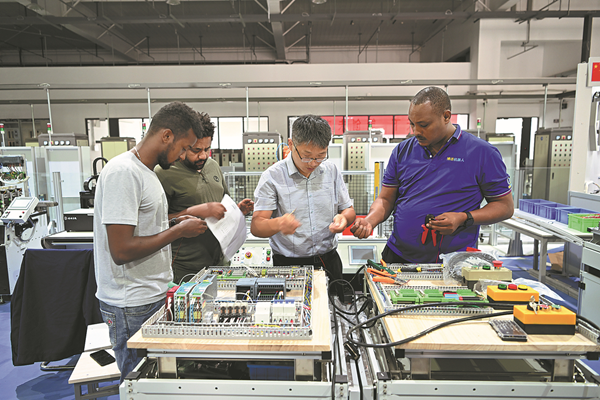Tianjin conference lauds ties with Ethiopian workshop

A Chinese instructor (second from right) teaches three trainees from African countries at the Luban workshop in Ethiopia. [Photo provided to China Daily]
The Luban workshop in Ethiopia has become an important faculty training center for 16 vocational colleges in four African countries— Ethiopia, Kenya, Tanzania and Uganda— delegates announced at a conference marking the project's second anniversary in Tianjin late last month.
The workshop serves the East African Skills for Transformation and Regional Integration Project, a regional initiative funded by three African governments and the World Bank, and has become an essential component of the vocational education system in the region, according to a newsletter distributed at the conference.
Located in the Ethiopian capital of Addis Ababa, the workshop has become a designated technology and skills training center for the entire African continent, the newsletter said, and was co-founded by the Tianjin University of Technology and Education, and the Federal Technical and Vocational Education and Training Agency in Ethiopia.
During the conference, two key centers were announced: a research center promoting basic Luban teaching guidelines to boost vocational education overseas, and a pilot center for the Tianjin University's Engineering Practice and Innovation Project (EPIP) for East-African technical and vocational education and training teachers, both of which will be in Ethiopia.
Teshale Berecha Yadessa, Ethiopia's Minister of Labor and Skills, received the appointment letter for the pilot center.
"We proposed the concept of the Luban workshop in September 2015, when we held discussions with vocational education leaders under the Ministry of Education. It seeks to boost international collaboration and create a brand for Chinese vocational education," said Lyu Jingquan, chief expert of the Luban Workshop International Development Research Center and vice-president of the Tianjin University of Technology and Education.
Named for Lu Ban, a structural engineer during the Spring and Autumn Period (770-476 BC) who was later deified and who is known in the country as the"father of carpentry", the workshops train professionals around the world.
Since 2016, 27 Luban workshops have been set up in more than 20 countries in Asia, Europe and Africa.
Workshop officials will help speed up the development of international professional teaching standards in more fields, Lyu said, adding that workshop alliances are planned with members of the BRICS (Brazil, Russia, India, China and South Africa) economic bloc, Shanghai Cooperation Organization and Association of Southeast Asian Nations members, and that stronger ties with countries involved in the Belt and Road Initiative will be forged.
"At the same time, we will deepen cooperation with American and Oceanic countries on vocational education projects and optimize the development of Luban workshops worldwide," Lyu said.
Major tasks include setting up more international study programs to better serve EPIP development, which will be key in efforts to upgrade the industrial sector.
Handiso Selamu Yisihak, a researcher and robot R&D Engineer at the Luban Workshop International Development Research Center at the TUTE, said the EPIP teaching model and Luban workshop training system will help meet the demand for skilled laborers in the industrial sector.
 京公网安备 11010802027341号
京公网安备 11010802027341号